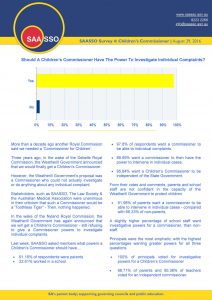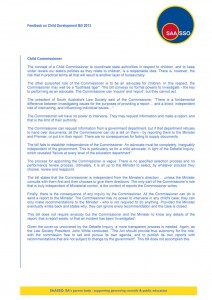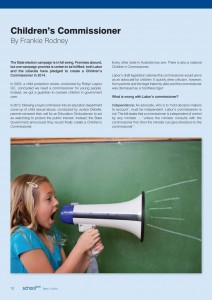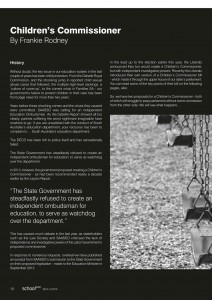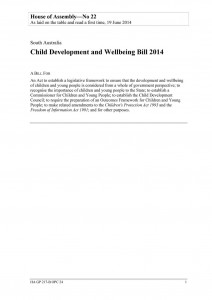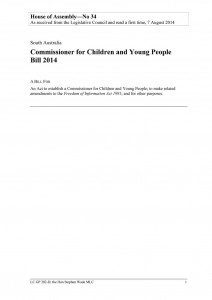In the wake of the Nyland Royal Commission, a Commissioner for Children is back on the State Government’s agenda. However, the Weatherill Government still refuses to give a commissioner investigative powers.
Recently, SAASSO polled parents and school staff on what powers they believe a Children’s Commissioner should have.
The results echoed the opinions of SAASSO, The Law Society, The Australian Medical Association and the State Opposition.
“Someone needs to protect our children.”
Update: 28/11/14
As the last week of parliament began, both sides of politics considered compromising in order to pass a children’s commissioner bill before the end of the year.
SAASSO wrote a letter to each member of the Legislative Council, reminding them of the need for a commissioner, but urging them not to compromise the powers vital to a genuine advocate for children.
SAASSO Media Report – “No kids commissioner better than ‘toothless tiger’….”
Since 2009, SAASSO h as called for an independent watchdog for our state’s education system.
as called for an independent watchdog for our state’s education system.
Two thirds of OECD countries have an ombudsman or agency to handle complaints about schools. The State Government, however, has consistently refused to create an Education Ombudsman.
However, following the scandal of the Debelle Royal Commission, and with ongoing crises in Families SA, the Weatherill Government announced it would create a Children’s Commissioner.
South Australia is the only state in the country without a commissioner (there is also a national Children’s Commissioner) and it was concluded we needed one in the Layton Review in 2003.
In 2013, SAASSO, along with the Law Society of South Australia, raised concerns about the lack of independence and investigative powers in the State Government’s plan for a commissioner. SAASSO’s concerns were not included in the revised legislation now before parliament.
In 2014, the State Labor Government has struggled to find support for its idea of a commissioner in the upper house of parliament. A Liberal proposal – bestowing the commissioner with investigative powers – has passed the upper house, but will fail to pass the lower house without Labor support.
So, as of November 2014, we have two pieces of legislation – the difference, being the investigative role of the commissioner – neither of which can become law without support from the other side of politics. Meanwhile, our children wait….
“The Law Society was critical, saying that without formal powers to investigate, ‘What is the commissioner really going to do’?”
SAASSO’s Reports
The Legislation
Published: 14/11/14

